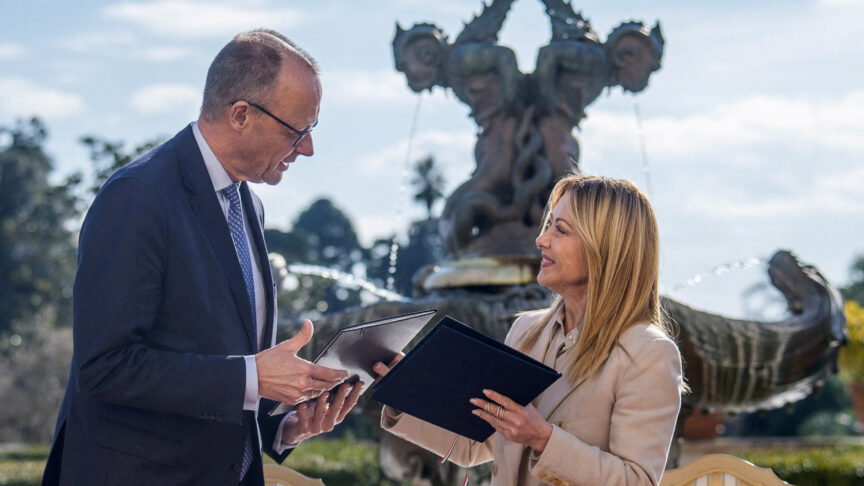A 6-point action plan for a transatlantic bargain
Politicians, academics, and other prominent senior experts from ECFR’s Council call on EU leaders to adopt a 6-point action plan for a transatlantic bargain
It is time for a new transatlantic alliance. Joe Biden’s victory opens the way for the most important values community in history to be reinvented for a new century. Americans expect the European Union to grow up and take more responsibility for its security rather than going “back to normal” and being looked after by the United States.
The new EU-US agenda for global change proposed by HRVP Josep Borrell is a step in the right direction. As leaders meet at the European Council, they urgently need to seize the opportunity of transforming – rather than restoring – the transatlantic alliance. Offering President-elect Biden a new transatlantic bargain that appeals to both European and US interests will set this in motion.
We – the undersigned – call on EU leaders to adopt these 6 key agenda points as part of the EU-US summit in the first half of 2021:
- Trade: On the global trade agenda, the EU can offer to work with the Biden administration to lead reform of the World Trade Organization (WTO). This means toughening regulations on industrial subsidies and state-owned enterprises, building on the existing trilateral process comprising the EU, the US, and Japan, and reviving the spirit of the 2018 Rose Garden deal between then-European Commission President Jean-Claude Juncker and former President Donald Trump. As a first step, the EU should ask the US to engage in serious negotiations on the dispute settlement process and to drop its objections to the globally preferred candidate to become the new Director-General. On the bilateral agenda, the EU should propose to the new Biden administration European support to work towards a compromise within the OECD on a digital tax in exchange for greater privacy protection both from US tech companies and within the US domestic regulatory apparatus.
- Climate: The EU and US should adopt a common carbon border tax regime, forming a sort of low-carbon trade zone. Such an arrangement would help create a level playing field between the EU and US, each one another’s largest trading partner. It would prevent each of them ever using retaliatory tariffs against the other and it would fulfil the Biden administration’s ambitions to renew ties with Europe and pursue an ambitious environmental policy that meets European standards for decarbonisation. Finally, and perhaps most importantly, it would allow both sides to leverage their enormous economic power of over 40 per cent of global GDP when taken together. This could help push other countries to adopt similar environmental standards, achieving the dual goal of domestic protection and a greener world economy. Other countries could join the low-carbon trade zone and escape the planned Carbon Border Adjustment Mechanism (CBAM) as they meet the necessary standards for decarbonisation.
- Digital sovereignty: Europe must evolve from a regulatory superpower to a tech superpower if it hopes to truly safeguard its values and interests in the digital space, reap the economic benefits of emerging digital technologies, and keep Europeans safe from disinformation and cyber attacks. European leaders need to show that they are putting in place European tools as well as cementing the transatlantic partnership in order to tackle future crises. A resilient common agenda first requires Europe to build up its capacities. This includes smart choosing of new technologies, securing Europe’s role in the tech supply chain, developing European capacity on AI and new technologies, and allocating EU funds to strategically support 5G roll-out. The EU and US should jointly invest in standards bodies to develop a strong voice in defining the basis of the digital future, protecting common values and democracy.
- Eastern neighbourhood: The EU is much more directly affected by Russia’s actions than the US is. European countries are both Russia’s biggest energy customers and compared to the US much more affected by Russia’s aggressive foreign policies, whether in Ukraine or Syria. For that reason, the EU has tried to maintain the space for dialogue even as it acts to deter Russian aggression. Since the 2014 Russian invasion of Ukraine, the EU has largely maintained that balance, as expressed by the fierce web of sanctions it has created to punish Russia for its aggression. A Biden administration that appears to be more overtly hostile to Russia might threaten this balance if it encourages some member states to adopt a similar stance. As part of an effort to take responsibility for European regional security, the EU should offer the Biden administration to create an Eastern Partnership Security Compact. That compact would form a European structure for funneling both European and American security assistance to the EU’s Eastern neighbourhood. This would offer Eastern Partnership states increased assistance and the Americans an assurance of a stronger western European commitment to European security – freeing up American attention for other problems while maintaining transatlantic unity and vigilance with regard to Russia.
- Iran: Having worked so hard to preserve the Iran nuclear deal over the last four years, European governments and the EU should issue a clear call to the incoming Biden administration and Iran to swiftly come back into full compliance with the nuclear deal. Once Biden is inaugurated, France, Germany, and the United Kingdom (the E3) should press the US and Iran to agree on steps for mutual re-compliance and then to build on the agreement. At the upcoming Joint Commission and Foreign Ministerial meeting among the current parties to the nuclear deal, the E3 and the EU should push to scope out pathways for Iran to reverse its nuclear activities. Europeans should stress to Iran that such steps will be a necessary component for the US to fully return to the nuclear deal under a Biden administration. The E3 and the EU should also formulate concrete economic plans for implementing their own commitments under the nuclear deal, including by bolstering humanitarian trade activities under the Instrument in Support of Trade Exchanges (INSTEX). In preparation for a possible US re-entry to the nuclear deal, Europeans should put together a series of proposals for how they can work with the Biden administration in providing swift sanctions relief to Iran in ways that meaningfully address the needs of the Iranian people.
- Turkey: Turkey is an important component of the transatlantic alliance but both the European and the US legs of the alliance are dysfunctional. It is important for the Biden administration and Europe to synchronise their policies and decide on a division of labour when it comes to transforming, redefining, and improving ties with Ankara. On a strategic level, Washington needs to find a solution to the S-400 crisis with Turkey that poses a challenge to NATO unity. On a political level, Turkey’s democratic deficit is a mirror reflection of its drift in foreign policy – but Europe, with its large trade and existing bilateral framework, has greater leverage to encourage Turkey to pursue a course correction in its domestic evolution. Equally important are the steps the Biden administration will take on the Syrian conflict and the potential impact of that for Turkey’s domestic evolution.
In the twenty-first century, the best way to defend the values of the West is to help the EU become a geopolitical actor, capable of defending its interests as an equal partner to the United States of America. A sovereign EU and a strong transatlantic alliance are two sides of the same coin. It is time to end theological arguments about strategic autonomy and start building the capabilities we need to thrive in a dangerous world.
Signatories
- Carl Bildt, ECFR Co-Chair; former Prime Minister and Minister of Foreign Affairs of Sweden
- Goran Buldioski, Director of Open Society Foundations’ Berlin Office and of the Open Society Initiative for Europe
- Gunilla Carlsson, Vice-Chair of the Global Fund Strategy Committee; former Deputy Director of UNAIDS; former Swedish Minister for International Development Cooperation
- Ian Clarkson, ECFR Board Member and founder of Celerant Consulting
- Robert Cooper, Diplomat and former Special Adviser at the European Commission and European External Action Service
- Marta Dassù, ECFR Board Member and Senior Director for European Affairs at The Aspen Institute
- Carlos Gaspar, Member of the Board of Directors, Portuguese Institute of International Relations
- Jean-Marie Guéhenno, former President and CEO of the International Crisis Group; former UN Under-Secretary-General for Peacekeeping Operations
- Connie Hedegaard, Chair of KR Foundation; former European Commissioner for Climate Action
- Toomas Hendrik Ilves, former President of Estonia
- Wolfgang Ischinger, Chair of the Munich Security Conference; former German Ambassador to the United States
- Claude Kandiyoti, CEO of Krest Real Estate Investments
- Piia-Noora Kauppi, Managing Director of the Federation of Finnish Financial Services
- Roderich Kiesewetter, Member of the Bundestag
- Remzi Lani, Director of the Albanian Media Institute
- Jean-David Levitte, President of the Foundation Council of the Geneva Centre for Security Policy; former French Ambassador to the United States and the United Nations
- Sonja Licht, President of the Belgrade Fund for Political Excellence
- Maria Livanos Cattaui, former Secretary General of the International Chamber of Commerce
- Isabel Mota, President of the Board of Trustees, Calouste Gulbenkian Foundation
- Kalypso Nicolaïdis, Professor of International Relations at University of Oxford
- Andrzej Olechowski, ECFR Board Member; former Minister of Foreign Affairs of Poland
- Dick Oosting, Chair of the Board, Asylos; former Europe Director of Amnesty International
- Marc Otte, Vice-President of the European Institute for Peace; former EU Special Representative for the Middle East Peace Process
- Zaneta Ozolina, Professor at the University of Latvia
- Janet Royall, Principal of Somerville College at University of Oxford; former Leader of the House of Lords
- Daniel Sachs, CEO of Proventus
- Klaus Scharioth, former German Ambassador to the United States
- Radosław Sikorski, Member of the European Parliament; former Minister of Foreign Affairs of Poland
- Christoph Steck, Director of Public Policy and Internet at Telefónica
- Alexander Stubb, ECFR Board Member; Director of the School of Transnational Governance at the European University Institute; former Prime Minister of Finland
- Hannes Swoboda, President of the International Institute for Peace; former Member of the European Parliament
- André Wilkens, Director of the European Cultural Foundation
The European Council on Foreign Relations does not take collective positions. ECFR publications only represent the views of their individual authors.


